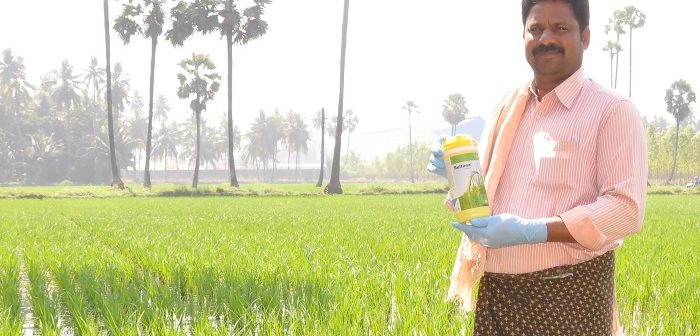Rice farmers in India will be able to boost productivity and income with the help of BASF crop protection solutions for rice, now available in the country for the first time.
“Our aim is to support India’s rice growers to realize their full potential. We will dedicate BASF’s expertise in modern, sustainable farming to the needs of the Indian rice growing community,” said Markus Heldt, President of BASF’s Crop Protection division, at today’s launch event in Hyderabad, India. BASF is a worldwide leader in crop protection, with global sales of more than €5.8 billion in 2015.
Rice is India’s most important food crop, with more than 100 million metric tons produced per year. Furthermore, India is a substantial exporter of rice to the global market, exporting over 10 million metric tons per year with significant opportunities to further increase output[3]. “With our new offerings for rice in India, we are strengthening our contribution to meeting the growing demand for farming technologies in India, one of the largest agricultural markets in the world,” Heldt said.
With this launch, BASF provides comprehensive solutions that effectively manage major rice diseases, weeds, and pests, while meeting consumers’ expectations for healthy, high quality food. These include the fungicides Seltima and Adexar, which combat a number of persistent rice diseases, including sheath blight and blast. Seltima is a BASF AgCelence fungicide, which not only controls diseases but also delivers higher yields. BASF’s herbicide Basagran will also be launched in India, solving difficult weed problems confronting Indian farmers. In the next three years, additional products will be launched in India to meet the growing need for modern farming solutions, including state-of-the-art herbicides, fungicides and insecticides.
BASF employs a dedicated team of nearly 200 crop protection experts in India to ensure a direct market presence, and is one of India’s leading providers of advanced crop protection solutions, covering all major crops, including soybeans, corn, cotton, wheat, fruits, vegetables and now rice. The company is continuously looking for new active ingredients that can control crop pests in unique ways. BASF established an Agricultural Research Station in Pune in 2015, which focuses on local and global agricultural research. It also operates a global research and development center at its Thane site in Navi Mumbai focusing on organic synthesis, advanced process and formulation research, discovery chemistry for modern agricultural solutions, and molecular modelling. In 2015, BASF invested around €500 million in crop protection research worldwide.
“With initiatives like Make in India, Smart Cities, and Swachh Bharat, India today is all about rapid, sustainable development. That means enormous growth in the demands of the population for better food, housing, and mobility as well as clean food, water and air. This provides huge opportunities for the chemical industry as well as BASF. And, BASF is investing actively in India to realize these opportunities,” said Dr. Raman Ramachandran, Chairman of BASF Companies in India.
The BASF Group has invested nearly €300 million in India over the past four years, in both manufacturing and innovation, in supporting local industries including scientific agriculture and food manufacturing, in sustainable transportation, pollution and emissions control, and in energy-efficient buildings and infrastructure.
The picture shows rice farmer Mr. Bolusu Sri RamakIshore holding a bottle of BASF’s new AgCelence fungicide Seltima




